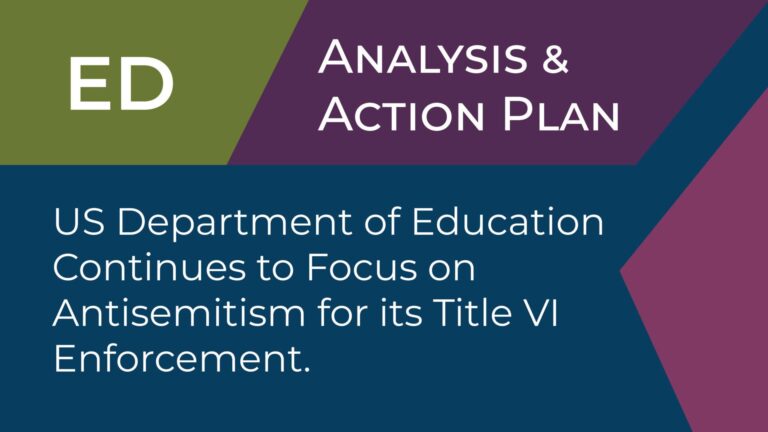Federal Alerts Highlight Rising Antisemitism Concerns in U.S. Colleges
The U.S. Department of Education has recently issued formal notices to 60 colleges across the country, spotlighting escalating issues of antisemitism within higher education settings. These warnings serve as a clear indication that federal authorities are intensifying oversight, emphasizing that institutions must take decisive action to combat discriminatory conduct targeting Jewish students. Failure to comply with civil rights protections could trigger comprehensive investigations or enforcement measures, reflecting the department’s dedication to fostering equitable and safe academic environments.
Central areas of emphasis outlined by the Department include:
- Swift and thorough investigation of antisemitic complaints
- Robust anti-discrimination policies explicitly banning hate speech
- Accessible support services for students affected by bias
- Comprehensive training programs for faculty, staff, and students to raise awareness
| Compliance Focus | Department Requirements | Possible Consequences |
|---|---|---|
| Incident Management | Prompt, transparent investigations | Federal probes and penalties |
| Policy Enforcement | Strict prohibition of antisemitic acts | Risk of funding withdrawal |
| Student Assistance | Provision of victim support resources | Mandatory program evaluations |
Overview of Federal Notices to Colleges Addressing Antisemitism
In a decisive move, the Department of Education has alerted 60 universities and colleges about potential breaches of federal anti-discrimination statutes linked to antisemitic incidents on their campuses. This action underscores the federal government’s resolve to guarantee a harassment-free academic atmosphere, particularly safeguarding Jewish students from prejudice and hostility. Institutions receiving these warnings are at risk of formal investigations that could culminate in enforcement actions under Title VI of the Civil Rights Act if they fail to implement effective remedies.
The Department’s communication stresses several critical compliance areas to prevent escalation:
- Enhanced complaint procedures: Schools must streamline grievance systems to ensure rapid and fair resolution of antisemitism reports.
- Proactive educational programs: Deployment of awareness and sensitivity training for the entire campus community.
- Ongoing transparency: Regular reporting to federal authorities on measures taken to address and reduce incidents.
| Geographic Region | Number of Colleges | Main Issue Identified |
|---|---|---|
| Northeast | 20 | Incidents of discriminatory rhetoric |
| Midwest | 15 | Reports of harassment |
| South | 12 | Deficient complaint handling systems |
| West | 13 | Insufficient outreach and education efforts |
Effects of Antisemitism on Campus Atmosphere and Student Wellbeing
Reports of antisemitic behavior on college campuses have raised alarms about the overall campus climate and the safety of students. These incidents not only affect Jewish students but also contribute to a tense and divided atmosphere that undermines the sense of community. University leaders are under growing pressure to respond swiftly and effectively to discriminatory acts to ensure all students feel protected and valued. Key challenges include:
- Rising occurrences: Increased episodes of hate speech, exclusion, and property damage targeting Jewish individuals and groups.
- Elevated stress levels: Many students report feeling unsafe or anxious about potential harassment or violence.
- Polarization: Conflicting viewpoints among student organizations complicate efforts to build consensus and harmony.
These dynamics disrupt academic focus and strain institutional resources. A recent survey of campus responses revealed inconsistent approaches, highlighting the need for standardized, effective policies. Below is a summary of common strategies employed by colleges under federal review:
| Intervention | Objective | Effectiveness Level |
|---|---|---|
| Mandatory Awareness Training | Educate community members about antisemitism and its impact | Moderate |
| Improved Reporting Channels | Facilitate documentation and follow-up of incidents | High |
| Heightened Security Measures | Protect vulnerable populations on campus | Varies |
Effective Strategies for Colleges to Combat and Prevent Antisemitism
Institutions under federal scrutiny for antisemitism are encouraged to implement a comprehensive strategy that emphasizes openness, education, and responsibility. Establishing clear and accessible reporting systems is essential to empower students and staff to report incidents without fear of reprisal. Integrating targeted training programs that address the complexities of antisemitism into broader diversity and inclusion efforts can enhance campus-wide understanding and vigilance.
Moreover, forging partnerships with Jewish advocacy organizations can offer valuable expertise and support in developing effective interventions. Regular policy reviews and updates ensure alignment with evolving federal standards and best practices. The table below outlines key approaches colleges should adopt:
| Core Approach | Practical Example |
|---|---|
| Transparent Reporting | Anonymous digital platforms for submitting complaints |
| Educational Programs | Compulsory workshops on antisemitism and bias awareness |
| Community Collaboration | Engagement with local and national Jewish organizations |
| Policy Audits | Annual evaluations of campus conduct and anti-discrimination policies |
Conclusion
The Department of Education’s recent warnings to 60 colleges mark a significant step in addressing antisemitism within higher education. These institutions now face increased pressure to implement effective measures swiftly, reflecting a broader federal commitment to protecting students’ civil rights and promoting inclusive campus cultures. The manner in which these colleges respond will likely influence national standards and practices for combating antisemitism in academic communities moving forward.







